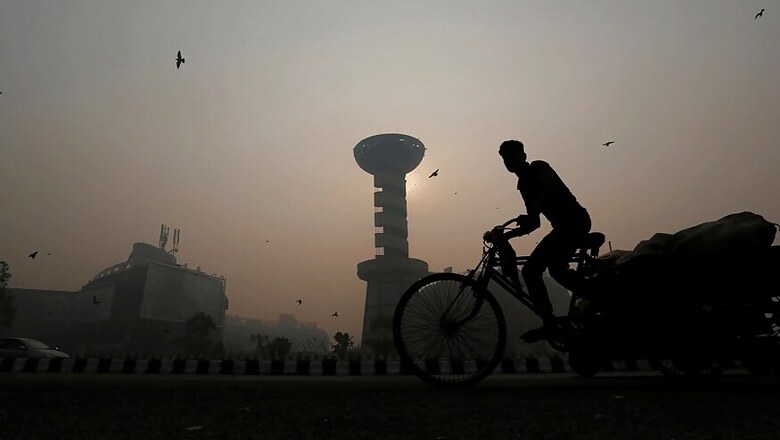
views
New Delhi: The Tehri Hydro Development Corporation's (THDC) proposed Khurja coal power plant in Uttar Pradesh will push up the cost of electricity and increase air pollution levels in Delhi, says a report by a research institute on Tuesday.
THDC India Limited (THDCIL), formerly known as Tehri Hydro Development Corporation Ltd, is a joint venture of the Centre and Uttar Pradesh government with equity sharing in the ratio of 3:1 (75:25 per cent).
The report by the Institute for Energy Economics and Financial Analysis (IEEFA) evaluating THDC's proposed Khurja coal power plant, has recommended re-evaluation of the proposal against severe air pollution levels in Delhi.
Delhi's air quality continued to be in the "poor" category Tuesday, a day after it had improved from "very poor" Air Quality Index (AQI) zone. The Graded Response Action Plan (GRAP), under which a host of measures are taken to bring down air pollution, is presently enforced in the national capital.
According to the IEEFA repot, the proposed plant will push up the cost of electricity at a time when the country's renewable energy options are cheaper, accessible and more sustainable.
At a round-table where the report was released, Tim Buckley, Director of Energy Finance Studies, IEEFA, said electricity users, state and central government, and the project's lenders should not be burdened with yet another expensive stranded asset at a time when local residents needed cleaner energy options.
"Delhi already has the dubious reputation of having the worst air pollution of any city in the world. If the Khurja coal plant is built as planned near Delhi, this will increase the impact on local residents, emergency workers as well as the local government.”
"The Khurja power plant was feasible when first proposed eight years ago in response to power supply shortages and outages across northern India, but technology has moved on," Buckley said.
The official said renewable energy generation in India was now cheaper than Khurja's non-mine mouth coal, with the ongoing price decline prompting states, including Uttar Pradesh, to seek solar and wind options to meet the incremental demand growth. "The Khurja proposal relies on a prohibitively expensive 900km long rail haul to bring coal to the plant. Additionally, the market price of coal continues to increase globally.
"Our analysis shows that any power generated at the Khurja plant would likely be sold for Rs 5.67/kilowatt hours, while renewable energy prices today are only +/- Rs 3/kilowatt hours. The economics of the project look dim. The Khurja proposal must be re-evaluated," Buckley added.
Kashish Shah, IEEFA Energy Research Associate and co-author of the report, says India's ambition to sustain double digit economic growth hinges on improving energy security and reducing the cost of power, and that requires sensible investment.
"India is aiming to achieve 40 per cent of its electricity generation needs by 2030 from non-fossil fuel sources including wind and solar. As a coal-fired power station takes significant time to ramp up power generation, the Khurja power station cannot help with grid stabilisation and peak demands, one of the new requirements of the Paris commitments.
"As the share of renewable energy options increase, India will need additional firming capacity and wider national grid inter-connectivity to integrate increasing amounts of variable solar and wind generation, and prevent frequency and voltage fluctuations that adversely affect grid stability," Shah said.
Shah pointed out that most of the state's incremental electricity demand will be met by cheaper, cleaner renewable energy capacity over the next ten years, not through an "overpriced, outdated and uncompetitive monolith" like the Khurja plant.
"The Khurja power project does not tick any boxes. Like the raft of previous thermal power plants now in financial distress, Khurja will likely add to the Power Finance Corporation's Rs 31,000 crore of stranded assets, and has been doggedly hampered by numerous legal and environmental challenges still before the courts.
"In our view, diversifying into the non-mine mouth coal-fired power sector is entirely outside TDHC's core expertise and a highly risky proposition no longer aligned with the Government of India's energy sector plan," Shah said.
He added that a pumped hydro storage project would far better align with India's world leading electricity sector transformation. "The long delayed, excessively expensive and redundant Khurja project should be cancelled before it becomes another expensive stranded asset in India," Shah added.













Comments
0 comment